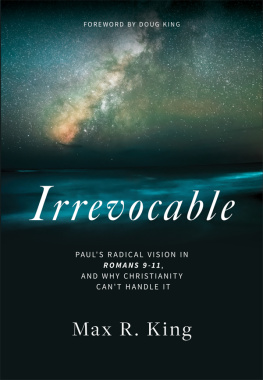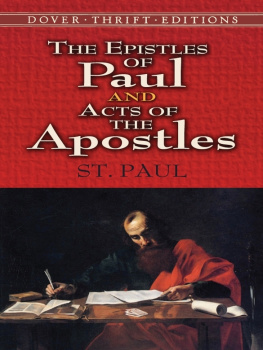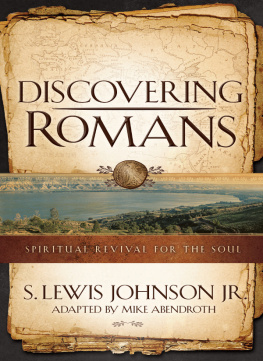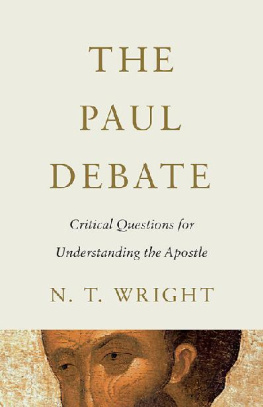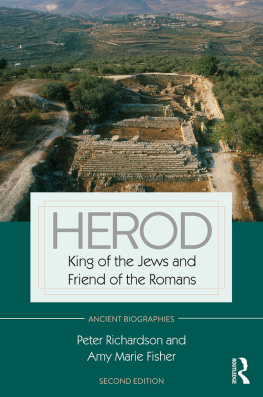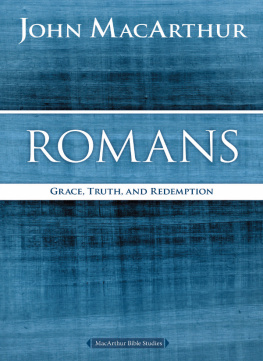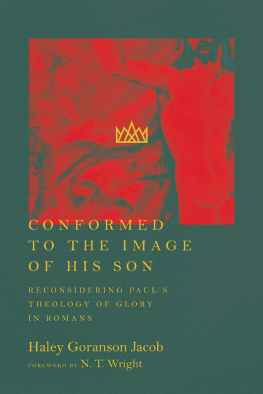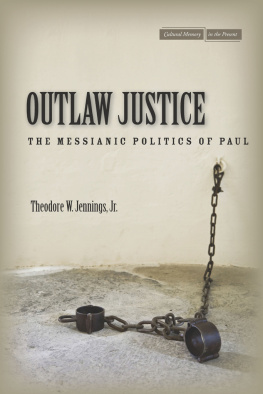Contents
Guide
IRREVOCABLE
Pauls radical vision in
Romans 9-11, and why
Christianity cant handle it.
Max R. King
Irrevocable: Pauls Radical Vision in Romans 9-11,
and why Christianity cant handle it.
Copyright 2019 Max R. King
Scripture taken from New King James, RSV and ASV.
Cover Design: Printopya
Interior Design: Printopya
Produced by Presence International
Presence.tv
ISBN: 978-1-949709-79-7
Dedicated to Robert Costa, friend, supporter and
Board Chairman of Presence Ministries.
His steadfast guidance has made this work possible.
Table of Contents
Prologue:
About the Author
This volume represents the culmination of a life-long labor of love in the investigation and in-depth study of the Biblical text by Max King.
The journey was quite an unlikely one when you consider its beginnings.
Max was born in the same farmhouse as his three siblings in the hills of West Virginia. His family was hard working and self-supporting, living off the land. He attended a one-room schoolhouse and small mountain church in those hills growing up. The family had no electricity or plumbing. The farm ran by literal horsepower. Homework was done by kerosene lamp.
His love of nature led to becoming president of the local chapter of the Future Farmers of America in high school. He saw himself following in the agrarian footsteps of those who had gone before.
Maxs family attended church three times a week, and sometimes more. When there gospel meetings were in town, they lasted a week to ten days, with attendance each and every night pretty much mandatory. Along the way, Max began bringing messages to his local congregation. Over time, he became an excellent speaker and provocative teacher.
Success in preaching led to full-time employment offers from churches across the state.
Max eventually left his agricultural fields and set out on a spiritual quest that forever changed the course of his life.
After years of self study, he wrote his first groundbreaking book, The Spirit of Prophecy, in 1971. It immediately sent shockwaves throughout his conservative evangelical denomination!
Max had boldly reinterpreted their long-held views on eschatology, the study of apocalypse and last things in Scripture. Rather than focus on the future, Max proposed eschatology as a return to the past; specifically the first century generation of Jesus and Paul.
While this volume contained references to the wider field of theological reflection on the subject, for the most part The Spirit of Prophecy was Maxs first attempt to lay out a personal commentary on the Biblical text. He was simply a preacher with a high school diploma offering a solution to what he saw as a multitude of problems in the Amillennial view of eschatology.
Jesus and Paul were reframed as figures heralding the end of one age and the beginning of a new one. It was the advent of a new heaven and earth nownot in the future.
As Max studied through the remainder of the 1970s, he began to read extensively from theologians past and present. He studied the views of Bultmann, Schweitzer, and others doing historical theology. This led to his publishing The Cross and The Parousia in 1987. This work took in a far wider frame of theological thought beyond the fundamentalist roots of his upbringing. It was this volume that expanded Maxs views on Paul, and the specific mission and purpose of his writings. Max began to point toward a unifying trajectory from Jesus to Paul rather than emphasize differences, as many mainline theologians were in the habit of doing. There was considerable expansion of reflection on the resurrection of the dead and its place in soteriology. Paul was interpreted to be inclusive of Israel, but the effects of resurrection life extended to all in Adam. At the same time, he pointed to the ekklesia as a first-fruits harvest, a body existing in the last days, meaning the last days of the Age passing in that generation. The End of this era resulted in the restored reign of God in Gods kingdom. God stood revealed as all in all.
But even as he published The Cross and The Parousia, there were impasses that he could not ignore. While he had written about Pauls background in Judaism as integral to his mission, there were not satisfactory answers (in his mind) as to how Paul saw the final outcome of Israel in the overall Biblical Narrative.
Never one to back down out of fear, Max came to understand that Paul was speaking to his Gentile audience from a universal viewpoint founded in the promises to Abraham and Abrahams lineage. Max also knew that the very term universal was anathema to the historical interpretations of most Christian scholars, who had ruled the theological empire for centuries.
After all, Christianity is the worlds largest religion. Its Church was meant to exist as an historical, ongoing entity. Right?
Isnt it insane to think Paul was revealing a Jesus who did not come to establish another world religion?
Yes and yes, in the minds of many. This is crazy talk! But perhaps it was time that someone should set aside previous paradigms, releasing our anxious grip on assumptions imported to the text from the very earliest centuries forward. Just maybe, this would create room for a Copernican solution to the remaining conundrums facing Pauline studies.
And so, here we are. This volume you hold in your hands Irrevocable represents the culmination of Max Kings long journey. After thousands of hours of study, the often-confounding puzzle piece of Romans 9-11 provides answers to the questions Max had entertained for decades, without fear of rejection or condemnation of heresy.
There is nothing at stake here other than an attempt to contribute to the ongoing evolution of understanding about the Biblical text and the Divine-human identity.
This book is not from the worlds of seminary or academia, though it is in dialogue with both. For some, this outsider status will be problematic. Yet Max is not intimidated. These pages do not another attempt to preach Christianity to a world thats heard it all before. For many, this will also be problematic. Yet, Max is willing to risk his standing among those in Christianity.
Max King never set out to write with hopes of pleasing the status quo. Nor will his legacy be one as a popular conference speaker or famous figure. Perhaps ongoing history will show why it was necessary for a no-name outsider to give himself to such an effort.
But he has come to know the peace that surpasses understanding, the fruit of setting out in faith and following a story to its end, no matter what the consequences.
As a son who followed in those footsteps, it is with my deepest gratitude that I offer this work for your consideration.
Where will your journey take you?
Doug King
CEO, Presence International (Presence.tv)
June 2019
#1
Introduction
It hardly needs pointing out that chapters 9-11 of Romans for centuries have been, and continue to be, one of the most problematic sections of Scripture in Pauline interpretation, particularly the concluding section 11:25-32, where Paul unequivocally confirms the salvation of all Israel. As Kasemann observed in his introduction to these three chapters, Probably no larger portion of Pauls writings can be said to have had a history of exposition which is more a suffering course of misunderstanding, acts of violence, and experimentation with shifting methods and themes.

